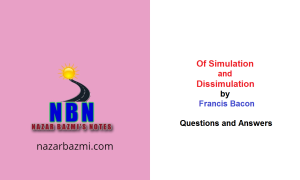✒️ “Every question opens a door; every answer is a step deeper into the world of stories, symbols, and soul.”
Introduction
Of Simulation and Dissimulation by Francis Bacon Questions and Answers

What is the central theme of Francis Bacon’s essay “Of Simulation and Dissimulation”?
The central theme is the exploration of the concepts of simulation and dissimulation, or the acts of pretending and concealing in human behavior.
How does Bacon define “simulation” in his essay?
Bacon defines simulation as the act of pretending to be what one is not, often for deceptive purposes.
How does Bacon define “dissimulation” in his essay?
Bacon defines dissimulation as the act of concealing or disguising one’s true intentions or feelings, often for strategic or protective purposes.
According to Bacon, what is the main objective of simulation and dissimulation?
The main objective is to achieve personal gain or to manipulate situations for one’s benefit.
How does Bacon view the ethical implications of simulation and dissimulation in his essay?
He views them as ethically questionable, especially when used for deceitful or malicious purposes.
What does Bacon mean when he says, “There is no vice that doth so cover a man with shame as to be found false and perfidious” in his essay?
He means that being discovered as false and deceitful is one of the most shameful vices a person can exhibit.
How does Bacon view the role of reputation in the context of simulation and dissimulation?
He sees reputation as a key element that can be either enhanced or damaged by simulation and dissimulation.
What is the potential harm of excessive simulation and dissimulation, according to Bacon in his essay?
Excessive use of these tactics can lead to a lack of trust and credibility, damaging one’s reputation.
How does Bacon advise individuals to balance honesty and simulation in their interactions with others?
He advises individuals to be honest and straightforward whenever possible, using simulation and dissimulation cautiously and sparingly.
What is Bacon’s view on the appropriate use of simulation and dissimulation for practical purposes?
He acknowledges that in certain situations, simulation and dissimulation may be used as pragmatic tools, but they should not become habitual.
What does Bacon mean by “We take cunning for a sinister or crooked wisdom” in his essay?
He means that people often mistake cunning or craftiness for a form of dishonest or deceptive wisdom.
How does Bacon describe the consequences of simulation and dissimulation on a person’s inner character?
He suggests that frequent use of these tactics can lead to a corrupted character, as one becomes skilled at deceit.
What does Bacon advise regarding the balance between honesty and concealment in personal conduct?
He advises individuals to prioritize honesty and to use concealment and pretense only when necessary, being cautious not to harm their reputation.
How does Bacon relate the concepts of “counsel” and “wisdom” to simulation and dissimulation in his essay?
He suggests that wise counsel should be used more often than simulation and dissimulation, emphasizing the importance of sound advice.
What is the role of “trial and examination” in discerning the true intentions of others, according to Bacon’s essay?
Trial and examination are essential tools to determine whether someone’s intentions are genuine or if they are merely simulating or dissimulating.
How does Bacon describe the potential impact of simulation and dissimulation on trust and credibility in personal and professional relationships?
He describes how excessive use of these tactics can erode trust and credibility, leading to suspicion and skepticism in relationships.
How does Bacon view the consequences of being overly candid and straightforward in one’s dealings with others in his essay?
He suggests that being overly candid and straightforward can sometimes lead to vulnerability and exploitation, indicating the need for discretion.
What is Bacon’s advice on maintaining trustworthiness and credibility in one’s actions?
He advises individuals to maintain trustworthiness by being reliable and consistent in their actions and to avoid excessive simulation and dissimulation.
How does Bacon emphasize the importance of maintaining a balance between honesty and discretion in interactions with others?
He emphasizes that individuals should practice honesty and straightforwardness while using simulation and dissimulation judiciously and with care.
What is the potential harm of being too predictable and transparent in one’s behavior, according to Bacon in his essay?
Being too predictable and transparent can make a person vulnerable to manipulation and exploitation by others.
How does Bacon view the use of simulation and dissimulation in the realm of politics and diplomacy in his essay?
He acknowledges that politics and diplomacy often involve the use of these tactics, but he cautions against their excessive use.
What does Bacon mean by “As we see in beasts, that those that are weakest in the course are yet nimblest in the turn” in his essay?
He means that even individuals who may be less powerful can excel in strategic maneuvers and adaptability when faced with challenges.
How does Bacon view the concept of “silence” and “taciturnity” in the context of simulation and dissimulation?
He suggests that silence and taciturnity can be effective ways to avoid the pitfalls of excessive simulation and dissimulation.
What is the potential consequence of relying too heavily on simulation and dissimulation, according to Bacon in his essay?
Relying too heavily on these tactics can lead to a loss of one’s true identity and an inability to distinguish between pretense and reality.
How does Bacon conclude his essay on simulation and dissimulation?
He concludes by emphasizing the importance of maintaining integrity and honesty in personal conduct while using simulation and dissimulation judiciously and sparingly.
What is the primary message that Bacon conveys in his essay “Of Simulation and Dissimulation”?
The primary message is to caution individuals against the excessive use of simulation and dissimulation, emphasizing the importance of honesty and integrity in personal conduct.
How does Bacon suggest that individuals should approach the use of simulation and dissimulation in their interactions with others?
He suggests that individuals should use simulation and dissimulation cautiously and sparingly, primarily valuing honesty and integrity in their dealings.
How does Bacon view the impact of simulation and dissimulation on trust, credibility, and reputation in his essay?
He views them as potentially damaging to trust, credibility, and reputation, especially when used excessively or for deceitful purposes.
What is the potential impact of excessive simulation and dissimulation on a person’s character and moral values, according to Bacon?
Excessive use of these tactics can lead to a corrupted character, as one becomes skilled at deceit and pretense.
How does Bacon advise individuals to maintain their authenticity while navigating situations that may require simulation or dissimulation?
He advises individuals to prioritize honesty and authenticity, using simulation and dissimulation only when necessary and with the utmost caution to avoid compromising their true selves.
- Francis Bacon Essays Questions and Short Answers
- Of Study by Francis Bacon Questions and Short Answers
- Francis Bacon essay Of Truth Questions and Short Answers
- Of Revenge by Francis Bacon Questions and Short Answers
- Francis Bacon essay Of Ambition Questions and answers
- Of Adversity by Francis Bacon Questions and Answers
- Of Death by Francis Bacon Question and Answers






